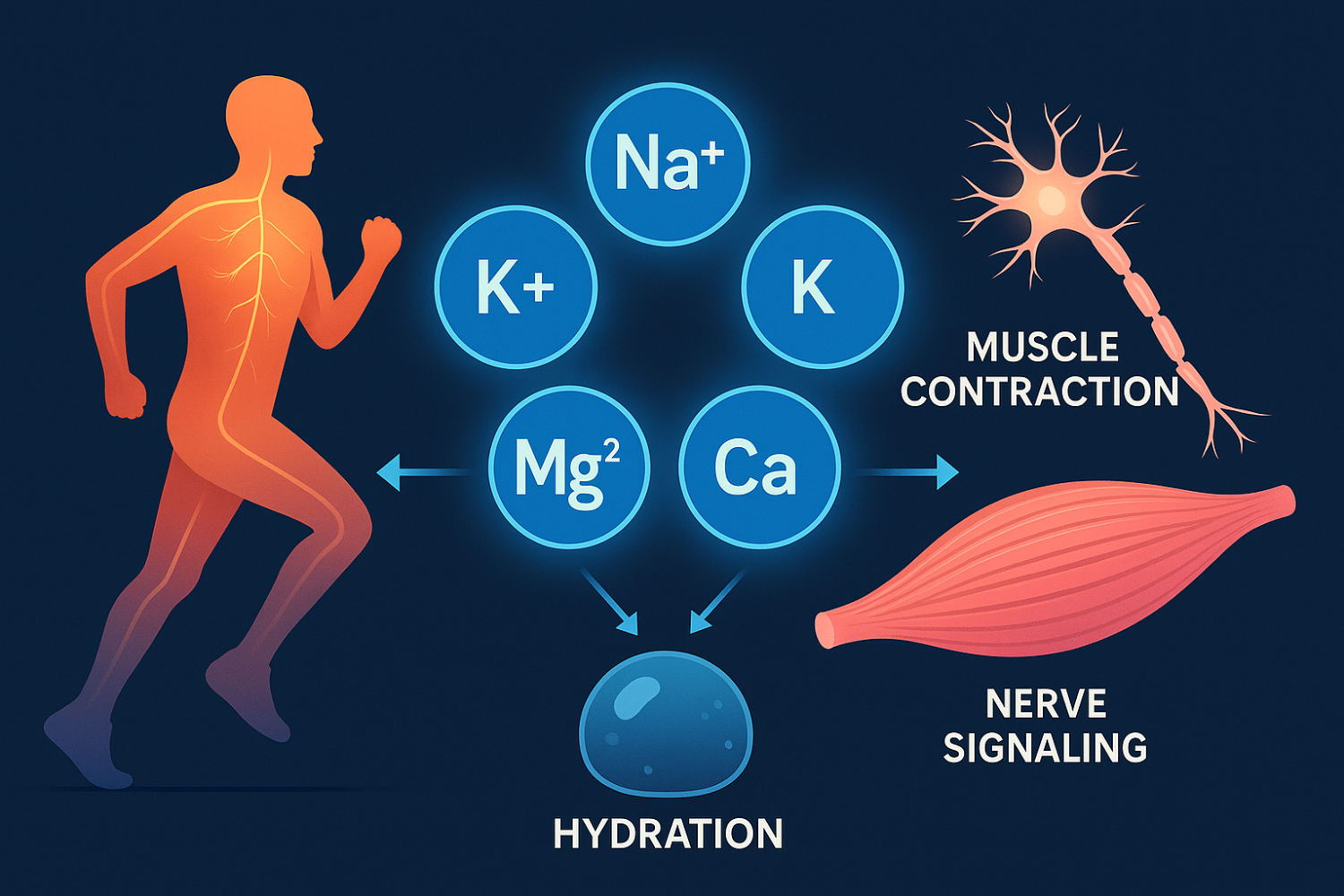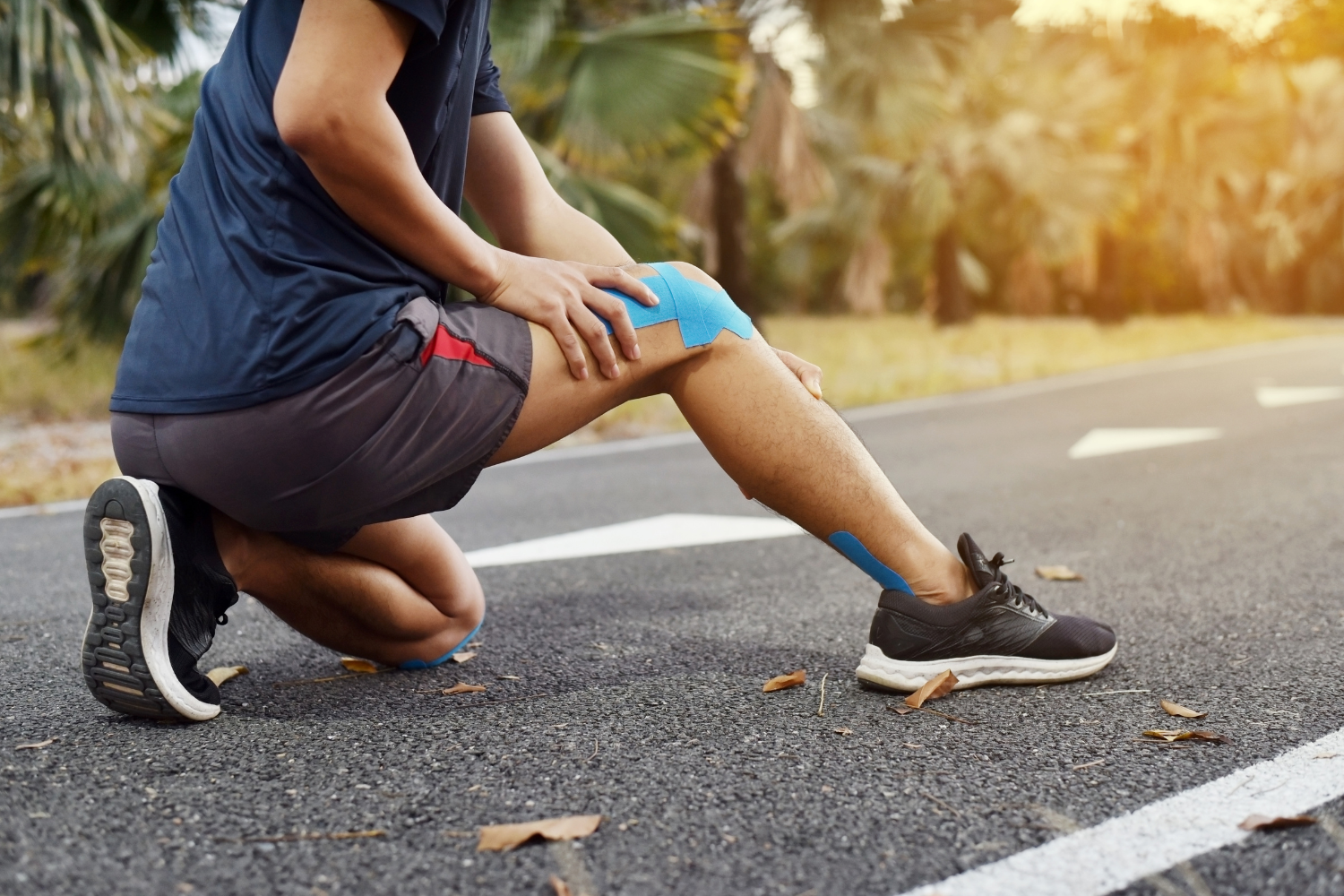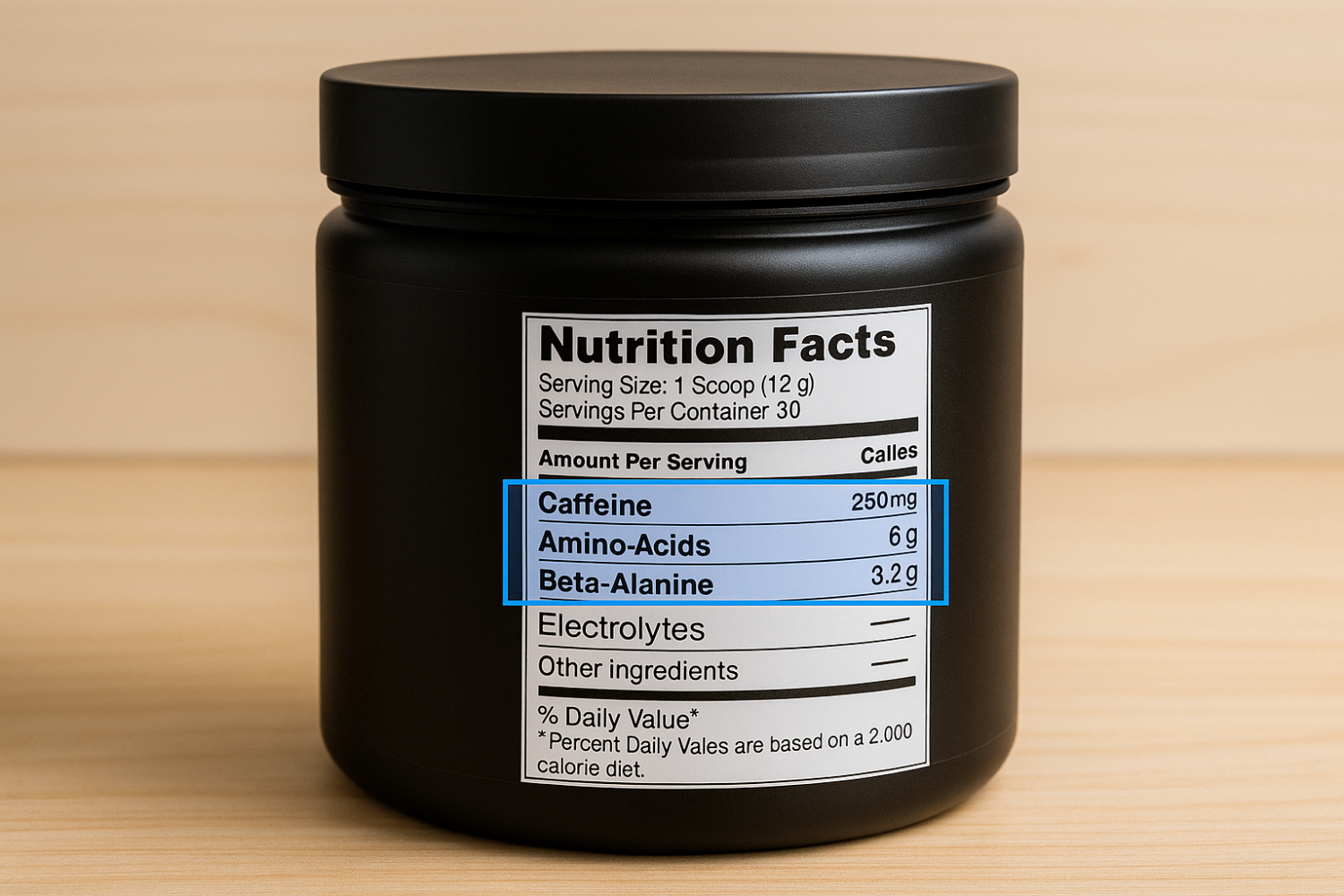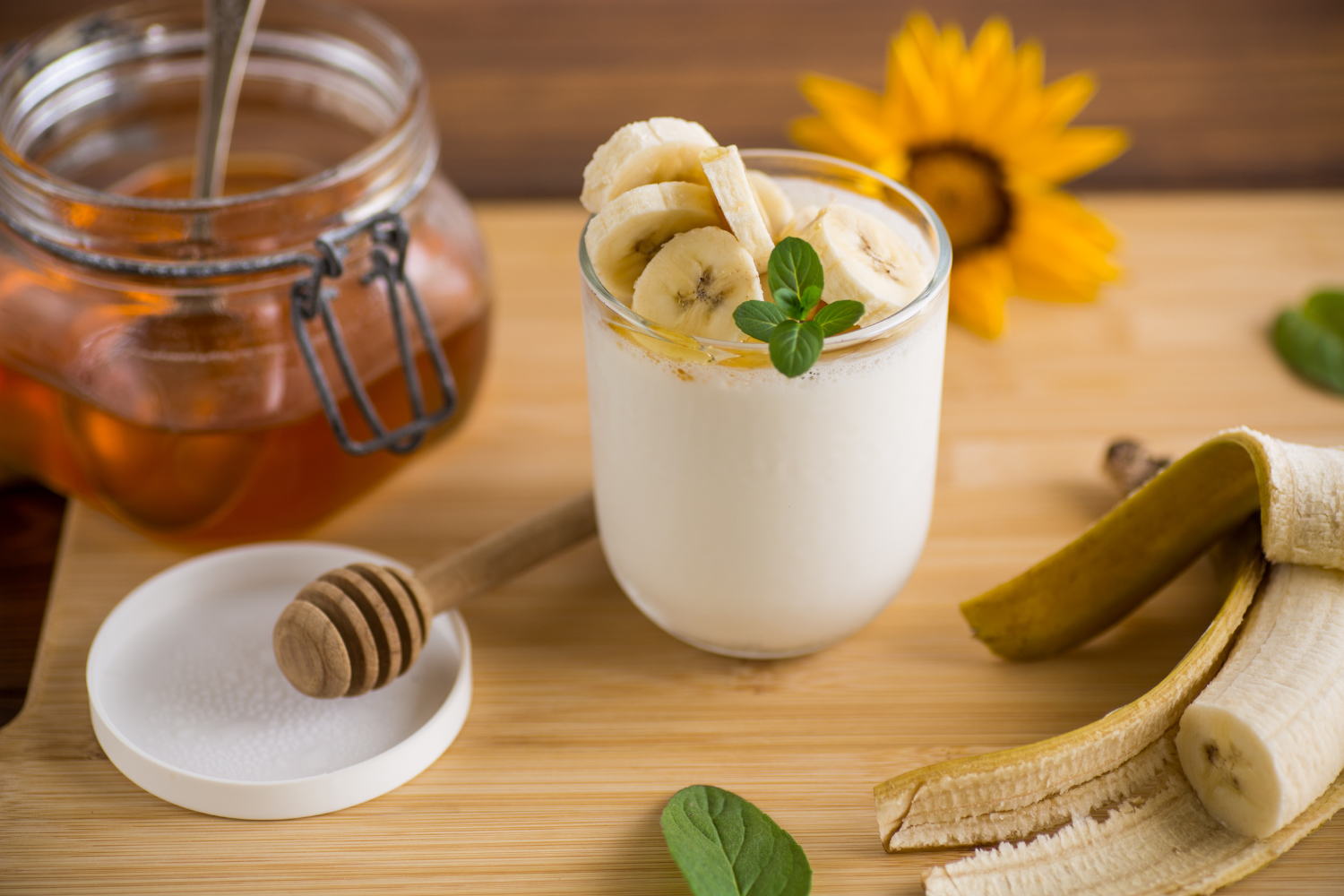Pre-workout supplements are designed to boost energy and support exercise performance, but they don’t always provide electrolytes. Many formulas focus on amino acids, caffeine, or beta‑alanine, sometimes without enough electrolytes required to help maintain fluid balance, muscle contraction, and nerve function in people engaging in intense exercise.
When electrolytes are lost through sweat and not replaced, athletes may experience muscle cramps, earlier onset of fatigue, and slower recovery after workouts. Understanding how electrolyte balance affects workout performance, what symptoms signal lost electrolytes, and how to read supplement labels helps ensure proper hydration and optimal performance in any fitness routine.
What Are Electrolytes and Why Do They Matter for Exercise?
Electrolytes are minerals such as sodium, potassium, magnesium, and calcium that help maintain optimal hydration by balancing fluids inside and outside your cells. They help support normal muscle contraction, nerve function, and fluid movement in the body, all of which affect workout and athletic performance.
Maintaining electrolyte balance before, during, and after intense exercise helps preserve fluid balance and may support recovery after workouts. Keeping electrolyte balance steady supports proper hydration, prevents early fatigue, and helps enhance exercise performance during prolonged exercise and high-intensity workouts.

What Are the Symptoms of Low Electrolytes?
Electrolyte levels that drop too low can make it harder to maintain balance in fluid and muscle function. Knowing the warning signs helps you replenish electrolytes in time to avoid fatigue and muscle fatigue during a fitness routine.
Early warning signs
Mild shifts in electrolyte intake often show up early, and noticing them can help prevent bigger issues. Some people report headaches in conditions of heavy sweating or dehydration, which might include electrolyte imbalance, though headaches have many possible causes.
Exercise-related signs
When workouts become more demanding, insufficient electrolyte replacement may impair exercise performance.
-
Muscle cramps that interfere with comfort or performance
-
Dizziness or lightheadedness during intense exercise
-
Feelings of weakness or reduced stamina
When low electrolytes can impact performance most
Electrolyte powder, electrolyte drinks, or sports drinks become especially important when heavy sweating occurs during endurance athletes’ training or in hot climates. Prolonged exercise under heat or heavy sweating can reduce plasma volume and increase the risk of marked fatigue, which may reduce performance capacity.
Replenishing lost electrolytes through a balanced blend of dietary supplements or an electrolyte drink may help maintain balance, support hydration, and reduce early fatigue during high‑intensity workouts.

Do Pre-Workout Supplements Usually Contain Electrolytes?
Pre-workout supplements are mainly marketed to improve workout performance, but they don’t always focus on hydration and electrolyte balance. Most are designed to give an energy boost, sharpen focus, and support muscle function, not necessarily to replenish electrolytes.
What pre-workouts are designed for (energy, focus, pump)
The main goal of pre-workout is to enhance exercise performance through energy production, improved blood flow, and mental focus. Many formulas use stimulants and amino acids to delay muscle fatigue and help delay onset of fatigue, helping athletes push through intense workouts or high-intensity training.
Ingredients you may find in pre-workout
Most pre-workout supplements contain a mix of performance-focused compounds, but electrolytes are not always part of the formula.
-
Caffeine boost helps support alertness
-
Amino acids, such as branched-chain amino acids for muscle protein synthesis
-
Beta‑alanine, which some studies suggest may delay the onset of fatigue during high‑intensity exercise
-
Creatine, which has been shown to support gains in muscle strength and lean mass under resistance training conditions
-
B vitamins for energy metabolism
-
Natural flavors or artificial flavors, depending on the product
When pre-workout formulas include electrolytes
Some pre-workout powders are designed with hydration and electrolyte balance in mind. These blends often add sodium, potassium, and magnesium to maintain optimal hydration, support nerve and muscle function, and replenish electrolytes lost during intense exercise. They are marketed as sports nutrition options for endurance athletes who need both energy and hydration during prolonged exercise.

How to Check the Label for Electrolytes in Pre-Workout
Reading the supplement facts panel is the easiest way to see if your pre-workout contains a balanced blend of electrolytes. Labels show the type, amount, and percentage of daily value for each nutrient, helping you know if electrolyte intake is enough for your fitness routine.
Look for sodium, potassium, magnesium, calcium
These minerals play essential roles in regulating fluid balance, muscle function, and electrolyte balance. Sodium and potassium regulate blood volume and fluid balance, while magnesium and calcium support nerve function and muscle contraction. If they appear on the label in meaningful amounts, the pre-workout is helping maintain balance in total body hydration.
Serving size matters — electrolytes may be present in small amounts
Some pre-workout supplements list electrolytes, but only in trace levels. Small servings may not be enough to replenish electrolytes lost in sweat, especially during prolonged exercise. Checking the serving size helps you understand whether the product is designed to support optimal hydration or if it merely includes electrolytes for marketing purposes.
Watch for added sugars or fillers that affect hydration
Some pre‑workouts include added sugars, artificial flavors, or fillers that might affect GI comfort. In some people, high sugar content can cause stomach upset. The effects of artificial sweeteners on hydration are not well established. Choosing a product with a clean, balanced blend of key ingredients helps support proper hydration without unnecessary additives.
Should You Take Extra Electrolytes with Pre-Workout?
Adding electrolytes can be beneficial, depending on the intensity of the workout, the amount of sweat loss, and overall sports nutrition goals. Knowing when to combine pre-workout with an electrolyte drink or powder helps maintain optimal performance and helps reduce muscle fatigue.
Situations where extra electrolytes help (sweating heavily, long-duration workouts)
Endurance athletes and anyone training in hot climates often lose significant amounts of sodium and potassium through sweat. Incorporating electrolytes before or during these sessions helps replenish lost electrolytes, may reduce the chance of muscle cramps, and maintain fluid balance for optimal performance.
When plain water is enough (short, low-intensity sessions)
For short workouts or low-intensity training, water is usually enough to maintain balance and support proper hydration. Since electrolyte intake needs are lower in these settings, adding an electrolyte drink may not be necessary to sustain exercise physiology or workout performance.
How to combine electrolytes with pre-workout safely
Combining a pre workout supplement with an electrolyte drink or electrolyte powder can be effective when matched to the demands of intense exercise. Look for a balanced blend of sodium, potassium, and magnesium without excessive added sugars. This approach helps maintain optimal hydration, supports muscle recovery, and reduces the risk of fatigue or stomach upset during high intensity workouts.
Natural and Supplemental Sources of Electrolytes
Electrolyte intake doesn’t have to come only from supplements. A mix of whole foods and sports nutrition products can help maintain balance and support hydration needs for different workout goals.
Food-based sources (bananas, leafy greens, coconut water, yogurt)
Everyday foods provide vital electrolytes that support hydration and muscle function.
-
Bananas supply potassium for fluid balance and muscle contraction.
-
Leafy greens like spinach add magnesium for nerve and muscle function.
-
Coconut water offers a natural blend of sodium, potassium, and magnesium, though quantities may be low compared to heavy sweat losses.
-
Yogurt provides calcium and potassium to support skeletal muscle health.

Electrolyte drinks and powders (support hydration and replenish sodium, magnesium, potassium)
Electrolyte drinks and powders are intended to help replenish lost minerals, maintain fluid balance, and may reduce onset of fatigue under conditions of heavy sweating. Unlike plain water, these dietary supplements provide the balanced electrolyte levels needed to support prolonged exercise and help reduce fatigue when combined with proper hydration and nutrition.
How to choose the right option for your workout routine
The best source depends on workout demands and personal tolerance. Food-based options fit everyday fitness routines, while endurance athletes and those training in hot climates may need an electrolyte drink or powder for optimal hydration. Choosing a balanced blend with key ingredients like sodium and potassium, without too many electrolytes or unnecessary fillers, helps maintain total body hydration and support hydration and performance during intense workouts.
Check Labels and Watch for Low Electrolyte Signs
Pre workout supplements are built for energy, focus, and pump, but hydration and electrolyte balance aren’t always included. Watching for early signs of lost electrolytes and checking supplement labels helps you decide if additional support is needed. LytePow is an electrolyte powder that make it easier to maintain proper hydration, support post-exercise recovery, and keep electrolyte levels steady before, during, and after workouts.
Frequently Asked Questions
Does pre-workout have electrolytes in it?
Some pre workout supplements include electrolytes, but many focus only on energy and performance ingredients.
What are the signs that I need electrolytes before a workout?
Thirst, fatigue, headaches, or frequent muscle cramps may signal electrolyte loss, though causes can vary.
Can I mix electrolyte drinks with pre-workout?
Yes, combining them can help replenish electrolytes while still boosting workout performance.
Is pre-workout enough for hydration?
No, most pre workout supplements are not designed to maintain optimal hydration on their own.
What should I look for in a pre-workout supplement label?
Check for sodium, potassium, magnesium, and calcium, along with serving size and added ingredients.
References
-
American College of Sports Medicine, Sawka, M. N., Burke, L. M., Eichner, E. R., Maughan, R. J., Montain, S. J., & Stachenfeld, N. S. (2007). American College of Sports Medicine position stand. Exercise and fluid replacement. Medicine and science in sports and exercise, 39(2), 377–390. https://doi.org/10.1249/mss.0b013e31802ca597
-
Kalman, D. S., Feldman, S., Krieger, D. R., & Bloomer, R. J. (2012). Comparison of coconut water and a carbohydrate-electrolyte sport drink on measures of hydration and physical performance in exercise-trained men. Journal of the International Society of Sports Nutrition, 9(1), 1. https://doi.org/10.1186/1550-2783-9-1
-
Maughan, R. J., & Shirreffs, S. M. (2010). Dehydration and rehydration in competative sport. Scandinavian journal of medicine & science in sports, 20 Suppl 3, 40–47. https://doi.org/10.1111/j.1600-0838.2010.01207.x
-
Sawka, M. N., & Montain, S. J. (2000). Fluid and electrolyte supplementation for exercise heat stress. The American journal of clinical nutrition, 72(2 Suppl), 564S–72S. https://doi.org/10.1093/ajcn/72.2.564S
-
Schwellnus, M. P., Drew, N., & Collins, M. (2008). Muscle cramping in athletes--risk factors, clinical assessment, and management. Clinics in sports medicine, 27(1), 183–x. https://doi.org/10.1016/j.csm.2007.09.006
-
Trexler, E.T., Smith-Ryan, A.E., Stout, J.R. et al. International society of sports nutrition position stand: Beta-Alanine. J Int Soc Sports Nutr 12, 30 (2015). https://doi.org/10.1186/s12970-015-0090-y



